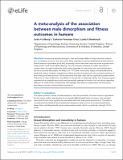Files in this item
A meta-analysis of the association between male dimorphism and fitness outcomes in humans
Item metadata
| dc.contributor.author | Lidborg, Linda H | |
| dc.contributor.author | Cross, Catharine Penelope | |
| dc.contributor.author | Boothroyd, Lynda G | |
| dc.date.accessioned | 2022-05-16T16:30:02Z | |
| dc.date.available | 2022-05-16T16:30:02Z | |
| dc.date.issued | 2022-05-13 | |
| dc.identifier | 278087674 | |
| dc.identifier | b64f3cdc-0e2b-4161-945e-1b428a1d4b15 | |
| dc.identifier | 85127777374 | |
| dc.identifier | 000796598300001 | |
| dc.identifier.citation | Lidborg , L H , Cross , C P & Boothroyd , L G 2022 , ' A meta-analysis of the association between male dimorphism and fitness outcomes in humans ' , eLife , vol. 11 , e65031 . https://doi.org/10.7554/elife.65031 | en |
| dc.identifier.issn | 2050-084X | |
| dc.identifier.other | Jisc: 119592 | |
| dc.identifier.other | ORCID: /0000-0001-8110-8408/work/113398929 | |
| dc.identifier.uri | https://hdl.handle.net/10023/25383 | |
| dc.description.abstract | Humans are sexually dimorphic: men and women differ in body build and composition, craniofacial structure, and voice pitch, likely mediated in part by developmental testosterone. Sexual selection hypotheses posit that, ancestrally, more 'masculine' men may have acquired more mates and/or sired more viable offspring. Thus far, however, evidence for either association is unclear. Here, we meta-analyze the relationships between six masculine traits and mating/reproductive outcomes (96 studies, 474 effects, N = 177,044). Voice pitch, height, and testosterone all predicted mating; however, strength/muscularity was the strongest and only consistent predictor of both mating and reproduction. Facial masculinity and digit ratios did not significantly predict either. There was no clear evidence for any effects of masculinity on offspring viability. Our findings support arguments that strength/muscularity may be sexually selected in humans, but cast doubt regarding selection for other forms of masculinity and highlight the need to increase tests of evolutionary hypotheses outside of industrialized populations. | |
| dc.format.extent | 33 | |
| dc.format.extent | 2906811 | |
| dc.language.iso | eng | |
| dc.relation.ispartof | eLife | en |
| dc.subject | Sexual selection | en |
| dc.subject | Human evolution | en |
| dc.subject | Sexual dimorphism | en |
| dc.subject | Masculinity | en |
| dc.subject | Mating success | en |
| dc.subject | Reproductive success | en |
| dc.subject | QH301 Biology | en |
| dc.subject.lcc | QH301 | en |
| dc.title | A meta-analysis of the association between male dimorphism and fitness outcomes in humans | en |
| dc.type | Journal item | en |
| dc.contributor.institution | University of St Andrews. Organic Semiconductor Centre | en |
| dc.contributor.institution | University of St Andrews. School of Psychology and Neuroscience | en |
| dc.contributor.institution | University of St Andrews. Centre for Research into Equality, Diversity & Inclusion | en |
| dc.contributor.institution | University of St Andrews. Centre for Social Learning & Cognitive Evolution | en |
| dc.identifier.doi | 10.7554/elife.65031 | |
| dc.description.status | Peer reviewed | en |
This item appears in the following Collection(s)
Items in the St Andrews Research Repository are protected by copyright, with all rights reserved, unless otherwise indicated.

